Are you comparing the best CRM software for small businesses? CRM software helps you manage customer relationships, increase sales, manage leads, and grow your business.
Due to the critical role customer relationship management (CRM) software plays in your business success, it’s extremely important that you properly research the industry and compare the top CRM providers before making your decision.
In this article, we will show you our expert pick of the best CRM software for small businesses. We will compare popular CRM software in terms of features and share the pros and cons to help you choose the best platform.
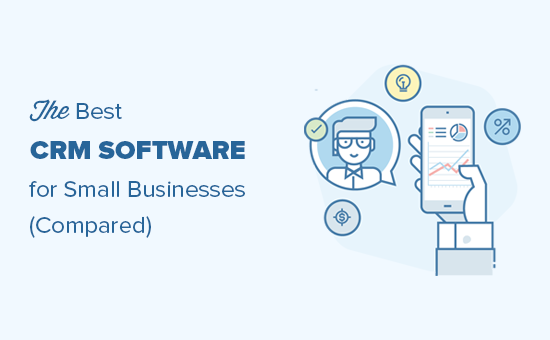
What Is CRM Software?
CRM software, or customer relationship management software, are tools that help you manage customer data and offer streamlined customer services across your business.
Most businesses need a contact manager to handle the contact details of their customers and prospects. In the early stages of most companies, this is typically done manually through spreadsheets or simple contact management tools.
However, these processes become inefficient as your business grows, and if you don’t fix the problem fast enough, then it can lead to a significant loss in opportunities and sales.
CRM software helps solve the problem by storing all aspects of customer relationships in a database and making it easily accessible. It allows your marketing, sales, and customer support teams to have all the data at their fingertips when needed.
CRM software is incredibly useful in increasing sales, building customer relationships, and providing amazing customer service. Your customers get more personalized, more attentive, and highly efficient service.
What to Look for When Choosing CRM Software
Since there are so many different CRM software companies out there, it becomes quite overwhelming for small businesses to decide which one is the best CRM for their needs.
Here are some quick tips on choosing the best CRM software for your business:
1. Ease of Use
A recent survey revealed that 67% of businesses put ease of use as the most important feature of their CRM software. You and your team will be using it for several hours every day. If the CRM is not easy to use, then it will not achieve your business goals.
2. Cloud and Mobile
In 2008, less than 12% of CRM software ran in the cloud. Today, 87% of CRMs are cloud-based software. It is more secure, faster, and easy to integrate with other apps and services.
Another study by Nucleus Research revealed that 65% of companies using a mobile-friendly CRM exceeded their sales targets. This means you want to look for CRM software that is mobile-friendly.
This makes it convenient for your teams to meet their targets. Your customers get quicker responses and don’t have to wait for hours just to get quick answers.
3. Make a Features List
You need to make a list of features that you need in your CRM software. Don’t worry if you can’t think of all the features right away. This exercise will give you an idea of what would be a good fit for your business.
CRM software is not just an address book of your customers’ contact information. They are useful because they integrate into your marketing, sales, and lead generation.
They help you manage every aspect of a customer’s journey with your business with great detail. You would need to see how you can integrate the specific CRM software with your existing business process and sales activities.
4. Integrations
Many modern CRM software applications include a ton of features. However, you will still need to get them to work with other apps, such as your WordPress website, lead generation software, email marketing service, business email service, social media platforms, and more. Make sure that your CRM software supports those integrations.
For example, if you are running a membership website or online store, then you would need your CRM to integrate with your membership plugin or eCommerce platform.
These are just some very basic requirements that you would want to check. You may also want to consider pricing, the ability to add users and departments, security, GDPR compliance, and more.
That being said, let’s take a look at the top CRM software on the market and how they stack up on these criteria.
1. HubSpot
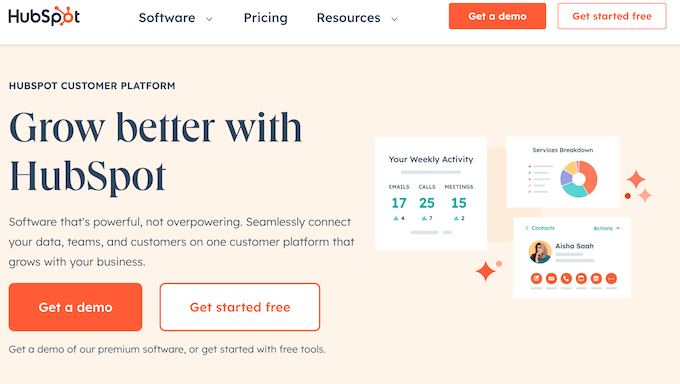
HubSpot is the best CRM software for small businesses looking for a cost-effective solution to get started. It offers free plans for its CRM, Marketing, Sales, and Service hubs.
The free HubSpot CRM comes with unlimited users and unlimited contacts. It is also free forever.
However, many of the features are limited or unavailable in the free plan. To access the powerful features, you will need to upgrade to one of their paid plans under the Growth Suite.
HubSpot is quite easy to use, and you can connect marketing, sales, and service hubs to your CRM software. This provides you with a wide range of tools to efficiently manage the customer journey.
With an easy user interface, you get a bird’s eye view of your entire sales pipeline on your dashboard. You can view detailed reports, all contact activities, sales activities, and user/team performance.
HubSpot offers a comprehensive set of features, including mobile apps for iPhone and Android, a contact manager, email templates, real-time notifications, phone calls, email tracking, scheduling, and more.
Integrations are crucial for CRM software. HubSpot integrates with more than 300 apps and services, including WordPress, top email marketing services, lead generation software like OptinMonster, and many more.
Pricing: HubSpot offers the core CRM platform for free. For more features, you can upgrade to their paid plans for Marketing, Sales, and Service hubs or upgrade to CRM Suite, which starts from $18/month and includes 2 users.
2. FunnelKit Automations
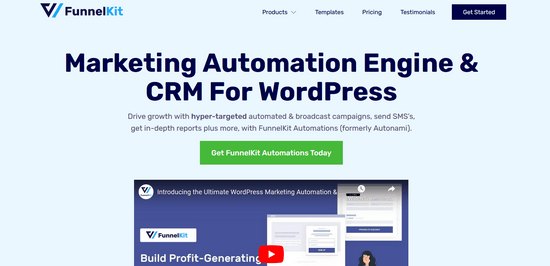
FunnelKit Automations is a powerful CRM and marketing automation engine for WooCommerce. It’s packed with features that will help your online store get higher order values and repeat sales.
With FunnelKit Automations, you can see every detail about your customers with a 360-degree contact view. This includes name, email, gender, geographical location, tags, lists, and custom field data.
You can also see their entire purchase history, including orders placed, items bought, coupons that were used, and more.
Aside from the CRM, FunnelKit Automations allows you to easily create automated email and SMS sequences to nurture your relationships and boost sales.
Using the drag-and-drop builder and pre-built workflows, you can quickly set up personalized campaigns for abandoned cart recovery, next order coupons, shipment tracking notifications, subscription renewal reminders, and more.
In addition, FunnelKit Automations comes with features like detailed analytics, revenue tracking, audience segmentation, contact journey, A/B testing, and seamless integrations with popular apps and plugins.
Pricing: FunnelKit Automations starts at $99.50 per year or $249.50 per year with the FunnelKit plugin, which is one of the best sales funnel builders on the market.
3. Salesflare
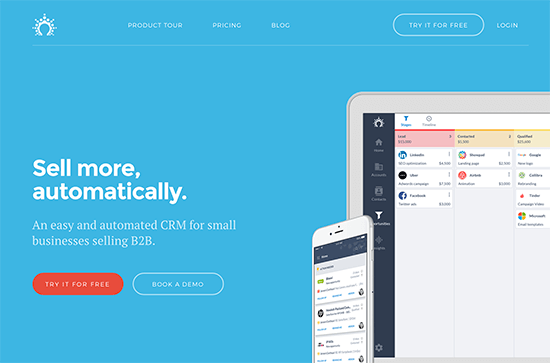
Salesflare is a powerful and easy-to-use CRM software for small businesses. The platform is built around four cornerstone features: organize, integrate, communicate, and automate.
Salesflare CRM puts you in control by showing you everything in one place in a visual pipeline format. You can collaborate with team members, add tasks, set up custom fields, see live notifications, and get insights.
What’s really neat about their platform is the fully automated contact and company information autofill. Instead of you searching LinkedIn profiles and other channels, Salesflare automatically fills the address book.
They integrate with over 1000+ popular platforms, including email marketing services and other business tools.
Salesflare smart follow-up tools make it so you are always on top and never miss a follow-up opportunity. They have smart automation that lets you follow up based on customer interaction and triggers.
Pricing: Salesflare offers a free trial. Their plan starts at $29 per month per user.
4. PipeDrive
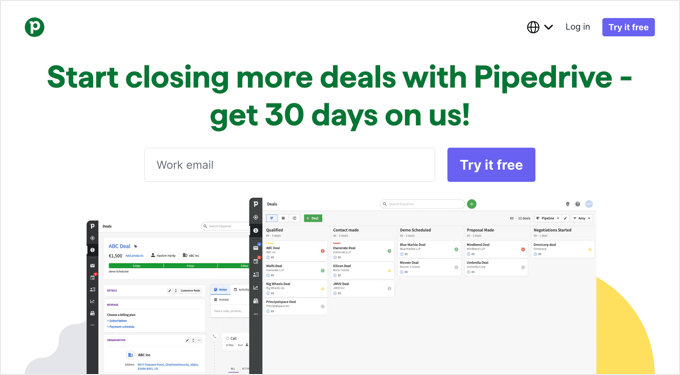
PipeDrive is a sales-driven CRM software for businesses. It offers complete sales pipeline management with an intuitive user interface that gives you quick access to all the information you need.
Designed for sales teams, it includes features like sales reporting, sales forecasting, detailed activity logs, advanced contact details, email integrations, and customizable pipelines.
It has a growing selection of integration apps, allowing you to connect your CRM system to other services you already use. It also has mobile apps for iOS and Android, allowing you to stay connected and get things done.
Pricing: Their plans start from $12.50 per user per month, billed annually.
5. Freshsales
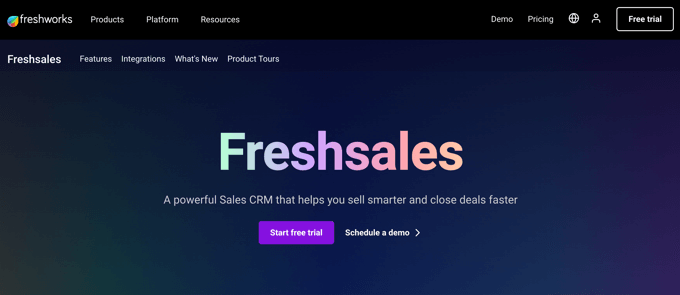
Freshsales is another popular CRM software suitable for businesses of all sizes. It features a sales-oriented approach with tools to maximize your conversions.
They offer a one-stop dashboard that gives you instant access to reports, activities, phone calls, emails, users, and contact management. It has an intuitive web-based interface and powerful mobile apps to help your teams make sales on the go.
Freshsales uses AI-powered lead scoring, which helps you prioritize leads that are more likely to convert. Other notable features include visual sales pipelines, actionable insights into conversations, event tracking, custom workflows, and more.
It has native integrations available for some of the most popular third-party services. Several more integrations are available as third-party apps. However, the number of integrations is a bit limited at the moment.
Pricing: Plans start from $15 per month per user billed annually.
6. Drip (eCommerce)

Drip is another popular eCommerce CRM software designed to increase sales. Featuring an intuitive user interface, it is incredibly easy to use yet extremely powerful.
It is loaded with features including marketing automation, advanced contact management, actionable reports, email campaigns, one-on-one conversations, eCommerce user tracking, and more.
Drip comes with native integrations for all top third-party services. This includes email services, lead generation software, SMS services, WooCommerce, Shopify, and many more. It offers workflows to generate leads from Facebook and Instagram, which helps you tap into their massive user base.
Pricing: Drip’s plans start from $39/month for up to 2500 contacts.
7. Streak CRM for Gmail
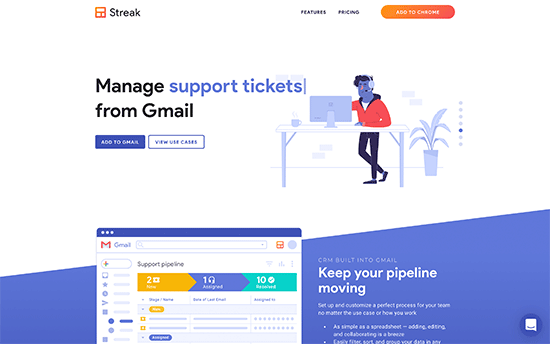
Streak is a CRM software for Gmail and works with both free Gmail accounts as well as Google Workspace. It allows you to track customer emails in Gmail, manage contacts, track leads, and manage sales pipelines.
It automatically captures leads from your contacts, allows you to add tasks and reminders, add tags and notes, create custom pipelines, schedule emails, and so much more.
It comes as a browser add-on as well as mobile apps for Android and iOS. It supports third-party integrations through Gmail and Zapier, which gives you access to share data across multiple tools and services.
Pricing: They offer a limited free plan for personal use. Their paid plans start from $15 per month for single users and $49 per user per month for businesses when billed annually.
Bonus: Constant Contact
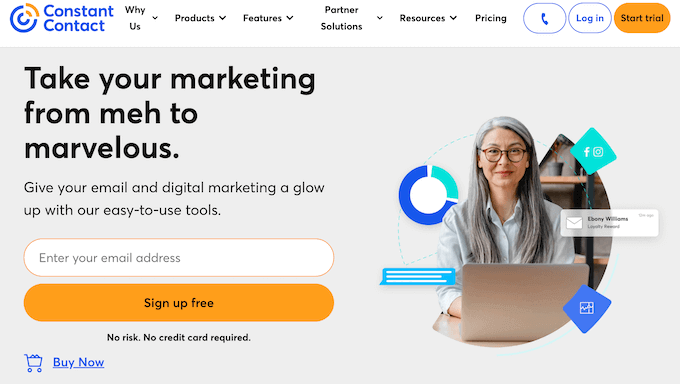
Constant Contact is a popular email marketing and CRM software. It allows you to easily store contacts, manage customer information, send emails, and track customer activity from your dashboard.
It is extremely easy to use with simple reports, detailed activity logs for each contact, and powerful drag-and-drop tools to send out emails. You can schedule emails, create sales funnels, and have easy marketing automation for beginners.
Constant Contact has a huge marketplace of integrations available for third-party apps. Many of the popular services and tools that you are already using, like WPForms, can be instantly connected to Constant Contact.
For eCommerce stores, Constant Contact offers integrations with all top eCommerce platforms. It includes eCommerce tools that help you capture, engage, and convert leads into paying customers.
Pricing: Their pricing is based on the number of contacts and starts from $12 per month. However, if you want to add team members, then you will need their Standard plan, which starts at $35 per month.
WPBeginner users get a free 60-day trial, and you can also get 20% off the first 3 months if you use our Constant Contact coupon code.
Click here to get started with Constant Contact.
Which Is the Best CRM Software for Small Business?
In our expert opinion, we believe that HubSpot, FunnelKit Automations, and Salesflare are the best CRM software for small businesses.
If you’re looking for a completely sales-focused CRM, then we recommend using either Salesflare or HubSpot because they’re both sales-driven CRMs, and they will help you improve your sales processes.
If you’re an eCommerce brand, and you need a CRM that comes with eCommerce-focused marketing automation, then look no further than FunnelKit Automations. It is extremely powerful and worth every single penny because it’ll definitely help you grow your overall sales.
We hope this article helped you find the best CRM software for your business. You may also want to see our list of the must have WordPress plugins for business websites, best business phone services, and best live chat software for small business.
If you liked this article, then please subscribe to our YouTube Channel for WordPress video tutorials. You can also find us on Twitter and Facebook.





Syed Balkhi says
Hey WPBeginner readers,
Did you know you can win exciting prizes by commenting on WPBeginner?
Every month, our top blog commenters will win HUGE rewards, including premium WordPress plugin licenses and cash prizes.
You can get more details about the contest from here.
Start sharing your thoughts below to stand a chance to win!
Akash Patel says
Great Blog. Thanks for sharing this information. This blog clear all my doubt and queries about the CRM Software
WPBeginner Support says
Glad our article was able to help
Admin
Kunle Ajayi says
Have been using Hubspot for quite sometimes now. I’ve never been disappointed with their services. Try them out, and if you are using the free plan, try automating some processes using Zappier and or IFTTT.
WPBeginner once wrote some tutorials about IFTTT if I guess right.
WPBeginner Support says
While not for CRMs we did write this article about IFTTT: https://www.wpbeginner.com/wp-tutorials/how-to-automate-wordpress-and-social-media-with-ifttt/
Admin